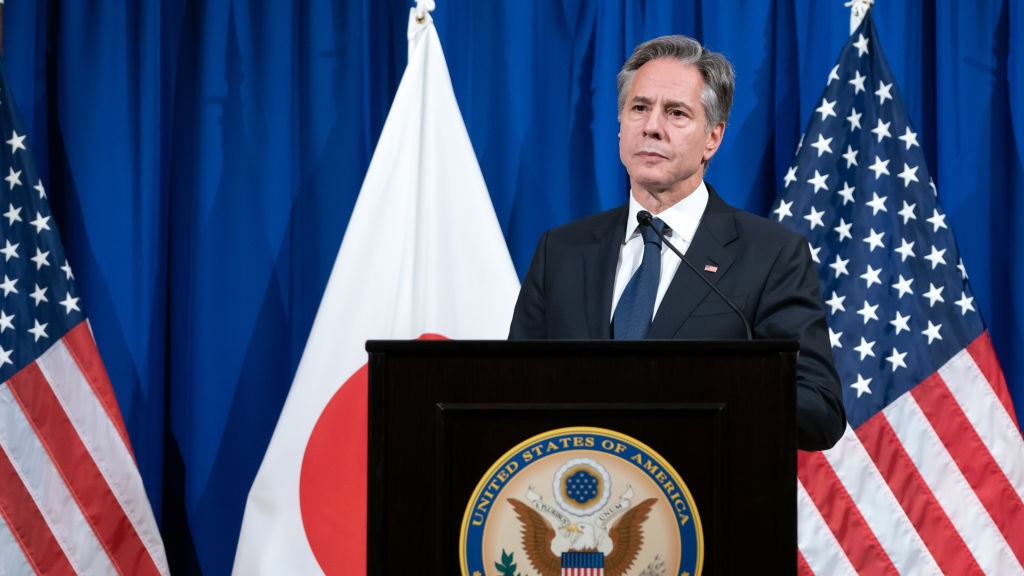Antony Blinken, the born and bred diplomat serving as US secretary of state
Blinken had served various State Department roles before being tapped for the top job


A free daily email with the biggest news stories of the day – and the best features from TheWeek.com
You are now subscribed
Your newsletter sign-up was successful
As the world watches the casualties and destruction mount during the Israel-Hamas war, a number of Western countries are attempting to mediate a peaceful solution. Few nations are more involved than the United States, and the U.S. efforts are being led by Secretary of State Antony Blinken.
A stalwart diplomat with years of foreign policy experience under his belt, Blinken has made a number of recent trips to Israel and Arab countries in an attempt to find a resolution to the war. As the country's primary foreign diplomat, Blinken isn't just juggling the Middle East portfolio, though. Among his other notable assignments are the continuing conflict in Ukraine and curbing China's influence.
Blinken held numerous roles within the State Department before being picked for the top job, and he has also worked for the National Security Council as its top adviser to the president. Where did Blinken get his start, and how has his career in foreign policy led him to this moment?
The Week
Escape your echo chamber. Get the facts behind the news, plus analysis from multiple perspectives.

Sign up for The Week's Free Newsletters
From our morning news briefing to a weekly Good News Newsletter, get the best of The Week delivered directly to your inbox.
From our morning news briefing to a weekly Good News Newsletter, get the best of The Week delivered directly to your inbox.
Blinken's beginnings
Antony Blinken was born in 1962 in Yonkers, New York. His career in foreign affairs isn't a huge surprise: his uncle "served as U.S. ambassador to Belgium, at the same time that Blinken's father was ambassador to Hungary," Politico reported. Blinken also had a stepfather who was an adviser to President John F. Kennedy and a number of French presidents.
After earning an undergraduate degree from Harvard University and a law degree from Columbia University, Blinken practiced law before transitioning into politics and policy. He worked on Michael Dukakis' 1988 presidential campaign and eventually landed a number of jobs in the Clinton administration. In 2002, he became the Democratic staff director for the Senate Foreign Relations Committee — whose top Democrat was Delaware Sen. Joe Biden.
It was in this Senate capacity that Blinken began developing a working relationship with the future president. Blinken eventually followed Biden to the White House in 2009, serving as the then-vice president's national security adviser during President Barack Obama's first term, according to his official State Department biography. In Obama's second term, Blinken "served as deputy secretary of state" and "Obama's principal deputy national security adviser," his biography added.
In 2020, President-elect Biden announced that he was nominating Blinken to his Cabinet as America's top diplomat. The Senate confirmed Blinken's nomination by a 78-22 margin in January 2021, making him the 71st secretary of state.
A free daily email with the biggest news stories of the day – and the best features from TheWeek.com
Secretary of state career
Upon being nominated, The Guardian reported, Blinken summed up his foreign policy doctrine: "We can't solve all the world's problems alone. We need to be working with other countries." He added, though, that the United States, "at its best, still has a greater ability than any other country on earth to bring others together to meet the challenges of our time."
After taking office, Blinken was quickly thrust into the spotlight as the United States withdrew from Afghanistan in the summer of 2021. In the midst of significant criticism leveled at the White House, Blinken acknowledged that "more could and should have been done" by the State Department to prepare for a scenario in which the Taliban rapidly took over the country.
Following the problematic withdrawal from Afghanistan, Blinken has worked to shore up American foreign relations with the European Union, China and a number of other regions. He has attempted to dissuade China from continuing its aggression in the South China Sea and elsewhere as relations with the United States continue to sour. During a recent meeting with the Chinese foreign minister, Blinken "discussed the importance of maintaining stability in the region and discouraging other parties from entering the conflict" between Israel and Hamas in Gaza, according to a readout of the meeting. He also "noted the importance of maintaining open channels of communication and responsibly managing the U.S.-China relationship."
Blinken's most pressing moments on the world stage have come during the wars in Ukraine and Gaza. His State Department authorized the shipment of weapons and aid to Ukraine after Russia invaded in early 2022. Blinken has also become deeply enmeshed in trying to negotiate peace in Gaza, and during multiple trips to meet with Arab leaders, he has "advocated for humanitarian pauses to facilitate getting fuel into the war-torn strip and getting civilians out," CNN reported.
Justin Klawans has worked as a staff writer at The Week since 2022. He began his career covering local news before joining Newsweek as a breaking news reporter, where he wrote about politics, national and global affairs, business, crime, sports, film, television and other news. Justin has also freelanced for outlets including Collider and United Press International.
